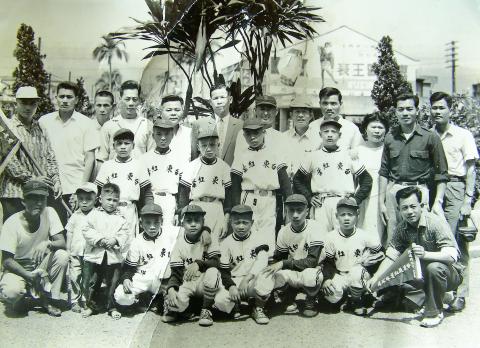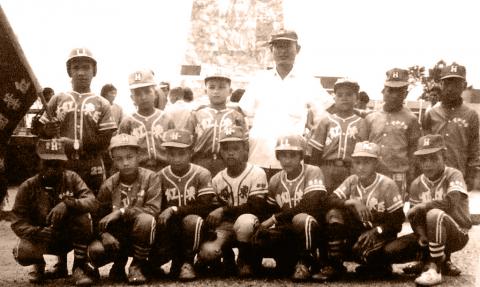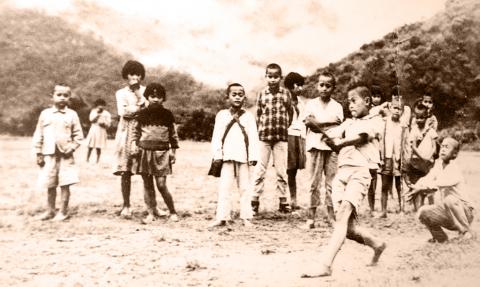Aug. 21 to Aug. 27
Chiu Sheng-teh (邱聖德) recalls protesting in anger when he heard a sports commentator say that the accomplishments in the 1960s of the Hongye Junior Baseball Team (紅葉少棒), made up of members from the Bunan Aboriginal people, were just an exaggerated legend that was sensationalized by the media and should not be celebrated.
Chiu’s father was a member of the 1968 team, which pretty much ignited Taiwan’s baseball craze, serving as a prelude to the glorious 1970s when Taiwanese teams dominated the international circuit.

Photo: Yang I-min, Taipei Times
But despite the team’s inspirational rags-to-success story, it seemed to always have its skeptics — and its fair share of controversy. In response, Chiu later published the study The Summer of 1968: A Study on Hongye’s Life History (1968年的夏天 - 紅葉少棒隊生命史的研究).
BASEBALL LEGEND
Let’s look at the legend first. It almost didn’t happen for the Hongye little league baseball team. Despite claiming first place at the Chiumao Cup (秋茂杯) in Tainan in March 1968, the team announced that it would not be able to make it to the National Youth Tournament in Taipei the following month because it lacked funding.

Photo: Chang Chun-wei, Taipei Times
Situated in an impoverished Aboriginal village in Taitung County, it is said that the team would often have to practice with “sticks as bats and stones as balls.” According to a news report from May 1968, the school only had 114 students and five staff, including the principal. Luckily, Hongye’s plight was widely reported in the media, and the donations poured in, enabling the team to participate. It eventually captured the championship by defeating a team from Chiayi 2-1.
The story does not stop here, as Hongye’s success earned it a match with a visiting Japanese all-star team. Up to this point, no Taiwanese youth team had defeated a youth team from Japan. On Aug. 25, however, after seven innings, Hongye emerged the winner with a 7-0 finish, and reportedly did not even allow a Japanese player past first base. Victory was sealed when Hongye scored two home runs in a row in the sixth inning. News reports show that bills of NT$10, NT$50 and NT$100 rained down from the crowd of 20,000 despite attempts by officials to stop the behavior.
Two days later, then-defense minister Chiang Ching-kuo (蔣經國) personally congratulated the team and promised that he would visit their village. In addition, the Ministry of Education announced that it would give the school NT$10,000 for sports equipment. The era of Taiwanese dominance of the diamond had just begun, which was a boost for the nation at a time when it was losing its international standing.

Photo: Wang Ing-ming, Taipei Times
Why would such a beautiful story have so many doubters?
THE DOUBTERS
First of all, there was the scandal that the team used older players from outside the school who competed under false names. As early as June 18, 1968, the United Daily News ran an article stating that 23 fans had reported the behavior to the Ministry of Education and the National Baseball Association.
Hongye denied the claims, and the association concluded that there was not enough evidence, and allowed the team to continue competing, adding that it had “strict” screening methods. Hongye principle Hu Hsueh-li (胡學禮) stated in a news conference that the accusations were made by jealous opponents.
Not much news was made of it over the following months, but on April 26,1969, coach Hu and the team’s manager were convicted and sentenced by the Taitung District Court for forgery of public documents. The United Daily News report said that they had falsified the ages of five players and also used players from outside the school who played under the names of several current players.
The final bit of controversy is that for whatever reason, the popular version of events became that Hongye beat the Japanese little league world champion Wakayama on that day. This version is perpetuated even to recent times, as the school celebrated the 40th anniversary of its victory against “Wakayama” in 2008.
Chiang Chieh-long (江杰龍) shows in the study The Rise of the Hongye Little League Baseball Team (台東紅葉少棒隊的崛起) that there was mass confusion in the media as to whom exactly Hongye would be playing, with each article stating something different or being ambiguous. In the end, the Wakayama version stuck.
Chiang’s argument, however, is that it could not have been the Wakayama team because they were competing in the Little League World Series in the US, which didn’t conclude until Aug. 24. The question is, was this confusion intentional to boost the team’s legend, or was it just sloppy reporting?

Dissident artist Ai Weiwei’s (艾未未) famous return to the People’s Republic of China (PRC) has been overshadowed by the astonishing news of the latest arrests of senior military figures for “corruption,” but it is an interesting piece of news in its own right, though more for what Ai does not understand than for what he does. Ai simply lacks the reflective understanding that the loneliness and isolation he imagines are “European” are simply the joys of life as an expat. That goes both ways: “I love Taiwan!” say many still wet-behind-the-ears expats here, not realizing what they love is being an

Google unveiled an artificial intelligence tool Wednesday that its scientists said would help unravel the mysteries of the human genome — and could one day lead to new treatments for diseases. The deep learning model AlphaGenome was hailed by outside researchers as a “breakthrough” that would let scientists study and even simulate the roots of difficult-to-treat genetic diseases. While the first complete map of the human genome in 2003 “gave us the book of life, reading it remained a challenge,” Pushmeet Kohli, vice president of research at Google DeepMind, told journalists. “We have the text,” he said, which is a sequence of

Every now and then, even hardcore hikers like to sleep in, leave the heavy gear at home and just enjoy a relaxed half-day stroll in the mountains: no cold, no steep uphills, no pressure to walk a certain distance in a day. In the winter, the mild climate and lower elevations of the forests in Taiwan’s far south offer a number of easy escapes like this. A prime example is the river above Mudan Reservoir (牡丹水庫): with shallow water, gentle current, abundant wildlife and a complete lack of tourists, this walk is accessible to nearly everyone but still feels quite remote.

It’s a bold filmmaking choice to have a countdown clock on the screen for most of your movie. In the best-case scenario for a movie like Mercy, in which a Los Angeles detective has to prove his innocence to an artificial intelligence judge within said time limit, it heightens the tension. Who hasn’t gotten sweaty palms in, say, a Mission: Impossible movie when the bomb is ticking down and Tom Cruise still hasn’t cleared the building? Why not just extend it for the duration? Perhaps in a better movie it might have worked. Sadly in Mercy, it’s an ever-present reminder of just